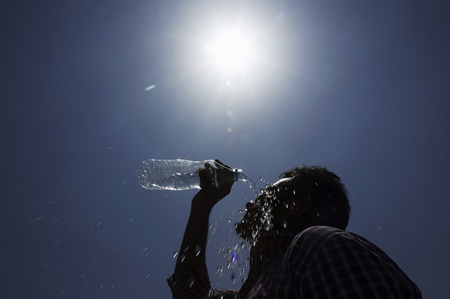Washington (AP) – Climate change doubters may have lost one of their key talking points: a particular satellite temperature dataset that had seemed to show no warming for the past 18 years.
The Remote Sensing System temperature data, promoted by many who reject mainstream climate science and most recently by Republican presidential candidate Sen. Ted Cruz, now shows a slight warming since 1998. Ground temperature measurements, which many scientists call more accurate, all show warming in the past 18 years.
 In this May 24, 2015 file photo, a man pours water on his face during a hot summer day in Hyderabad, India. Climate change doubters may have lost one of their key talking points: a particular satellite temperature dataset that had seemed to show no warming for the past 18 years. (AP Photo/Mahesh Kumar A., File)
In this May 24, 2015 file photo, a man pours water on his face during a hot summer day in Hyderabad, India. Climate change doubters may have lost one of their key talking points: a particular satellite temperature dataset that had seemed to show no warming for the past 18 years. (AP Photo/Mahesh Kumar A., File)
“There are people that like to claim there was no warming; they really can’t claim that anymore,” said Carl Mears, the scientist who runs the Remote Sensing System temperature data tracking.
The change resulted from an adjustment Mears made to fix a nagging discrepancy in the data from 15 satellites.
The satellites are in a polar orbit, so they are supposed to go over the same place at about the same time as they circle from North to South Pole. Some of the satellites drift a bit, which changes their afternoon and evening measurements slightly. Some satellites had drift that made temperatures warmer, others cooler. Three satellites had thrusters and stayed in the proper orbit, so they provided guidance for adjustments.
Mears said he was “motivated by fixing these differences between the satellites. If the differences hadn’t been there, I wouldn’t have done the upgrade.”
NASA chief climate scientist Gavin Schmidt and Andrew Dessler, a climate scientist at Texas A&M, said experts and studies had shown these problems that Mears adjusted, and they both said those adjustments make sense and are well supported in a study in the American Meteorological Society’s Journal of Climate.
The study refutes the idea of a pause in global warming, “but frankly common sense and looking at how Earth was responding over the past 18 years kind of makes this finding a ‘duh’ moment,” wrote University of Georgia meteorology professor Marshall Shepherd.
Chip Knappenberger of the Cato Institute, who doesn’t doubt that human-caused climate change is happening but does not agree with mainstream scientists who say the problem is enormous, said this shows “how messy the procedures are in putting the satellite data together.”
The other major satellite temperature data set, run by University of Alabama Hunstville professor John Christy, shows slight warming after 1998. But if 1998 is included in the data, it sees no warming. But that should change with a warm 2016, Christy said.




